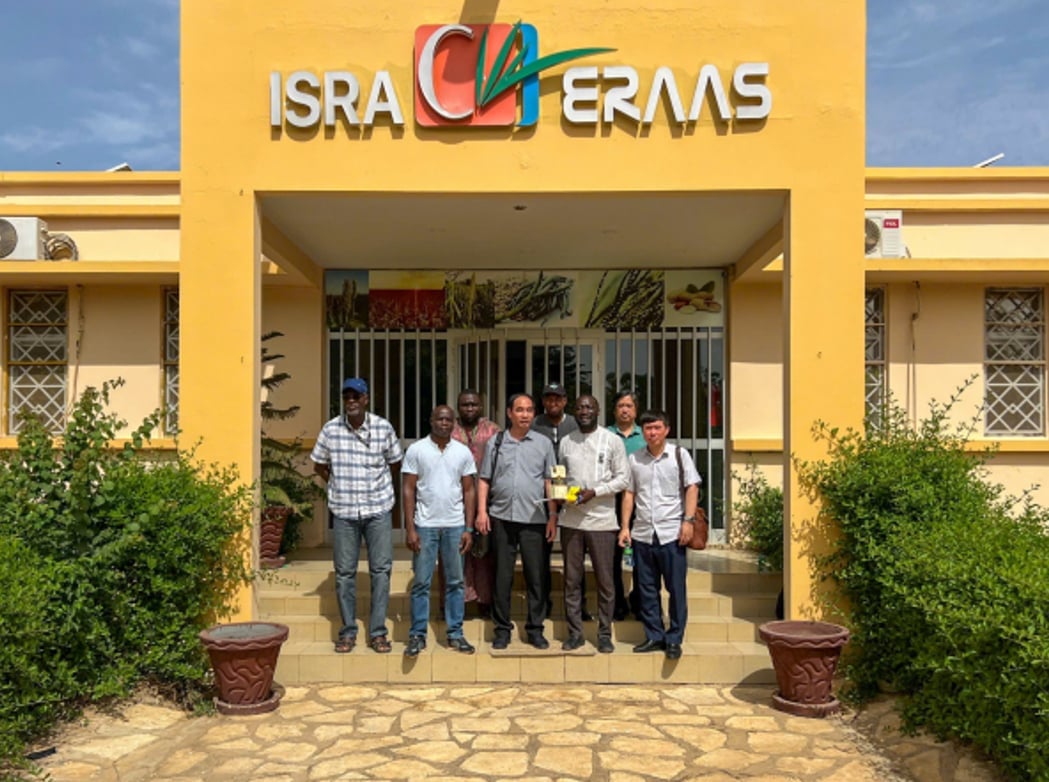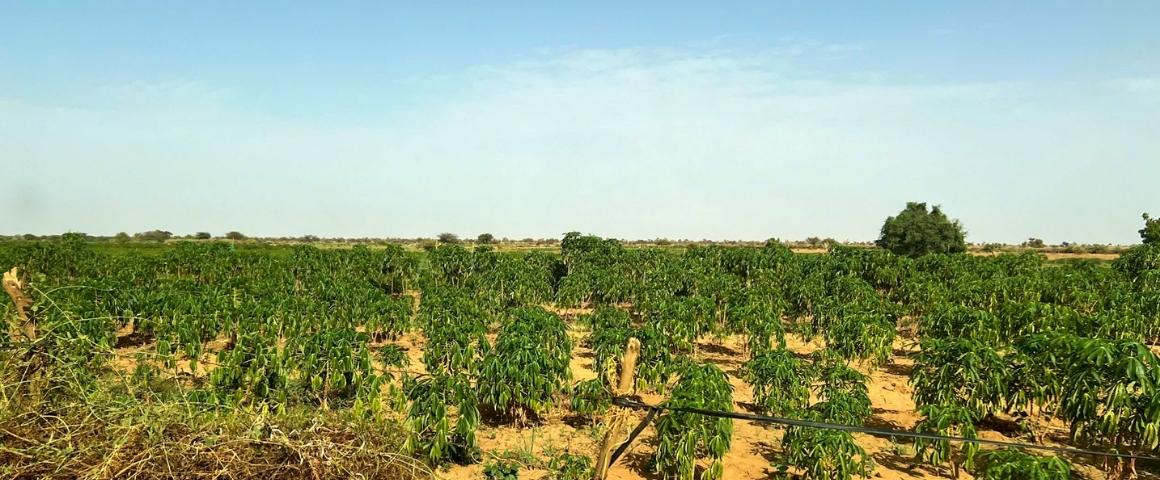December 8, 2025 | 00:54 GMT +7
December 8, 2025 | 00:54 GMT +7
Hotline: 0913.378.918
December 8, 2025 | 00:54 GMT +7
Hotline: 0913.378.918
This is one of the first exchange activities following the signing of a Memorandum of Understanding (MoU) between the Ministry of Agriculture and Environment of Vietnam and the Ministry of Agriculture, Food Security and Livestock of Senegal on July 23 in Dakar, during the official visit of National Assembly Chairman Tran Thanh Man to this country.
Earlier, in June, a Vietnamese scientific delegation visited Senegal to explore and expand opportunities for cooperation in developing ecological agriculture, as Senegal has been selected by the Food and Agriculture Organization of the United Nations (FAO) as a pilot country for the Scaling up Agroecology Initiative.
During the visit, two sides exchanged experiences on rice cultivation, sustainable agricultural production, as well as public policies supporting the agroecological transition. Facing common challenges such as salinity intrusion, climate change, and ensuring food security, CIRAD has implemented this initiative in continental Southeast Asia and the West African Dry Zone, with the support of the Ministry of Europe and Foreign Affairs, under the framework of South-South cooperation.

The working delegation included scientists from the Vietnam Academy of Agricultural Sciences (VAAS), the Institute of Policy and Strategy for Agriculture and Environment (IPSAE), along with officials from the Ministry of Agriculture and Environment. Photo: CIRAD.
Working with researchers, cooperatives, farmers, and local authorities, the Vietnamese delegation had the opportunity to study Senegal’s community-based dryland farming models, aimed at fostering institutional innovation and local initiatives. Conversely, Senegal expressed its interest in learning from Vietnam’s experience in rice cultivation and breeding.
Rice was identified as a shared technical priority throughout the mission. In meetings with the Senegalese Institute for Agricultural Research (ISRA), the Senegal River Valley Development Authority (SAED), and AfricaRice, the two sides focused on rice breeding, irrigation management, and low-emission farming techniques. The Senegalese side highlighted the urgent need to strengthen domestic rice production, especially in areas affected by salinity and drought. However, the country continues to face constraints in seed quality, access to water resources, and the organization of cooperatives within the rice value chain.
The Vietnamese delegation shared its experience in developing salt and drought-tolerant rice varieties, applying alternate wetting and drying (AWD), the System of Rice Intensification (SRI), and integrating rice and fish farming. These exchanges laid the groundwork for initial cooperation in adapting to ecological conditions that share many similarities.
The delegation also visited "Living Lab" sites in Fatick and the Lac de Guiers region, implemented by the Local Agroecological Transition Initiative (Initiative pour la Transition Agroécologique Locale, DyTAEL), a field-level platform implemented by a coalition of NGOs, in collaboration with the NGO network ENDA-Pronat. These sites serve as spaces for co-developing and testing agroecological solutions. The Living Lab approach encourages innovative collaboration between farmers and support organizations to address local challenges such as salinity intrusion and erratic rainfall.
In many Living Lab villages, farmers have applied ecological rice cultivation models, intercropped with fruit trees, and used compost to improve soil fertility in saline and drought-prone areas. Local authorities and communities emphasized that this approach enhances cooperation and knowledge exchange within the community.
Between 2014 and 2023, Senegal’s agricultural output increased by as much as 220%. Nevertheless, the country still imports about 70% of its rice, wheat, and maize. While agriculture employs more than one-third of the labor force, the sector continues to face challenges such as limited crop diversification and rapid natural resource degradation.

The “Living Lab” model in Fatick, where farmers cultivate rice alongside fruit trees with the support of the DyTAEL initiative. Photo: CIRAD.
Alongside technical meetings, the Vietnamese delegation also held high-level discussions with the Ministry of Agriculture, Food Security and Livestock of Senegal, FAO, the French Development Agency (AFD), and the International Fund for Agricultural Development (IFAD). These dialogues positioned Vietnam-Senegal cooperation within a broader vision of agroecological transition and strengthening the resilience of food systems, with strong support from governments and international organizations.
Building on this first exchange mission, partners expect to co-develop research activities, foster mutual learning, share experiences, and mobilize the participation of development organizations to advance the sustainable transition of agroecology.
Reinforcing this momentum, during a bilateral meeting at the World Economic Forum in Tianjin (China) in late June 2025, the presidents of Vietnam and Senegal expressed a joint commitment to deepening agricultural cooperation, particularly in rice and cashew through knowledge exchange, food security partnerships, and South-South cooperation.
Vietnam Agriculture and Nature Newspaper (VAN News) will provide updates on technical exchange activities as well as field visits in Son La and Hai Phong provinces, within the framework of agricultural SSTC.
Translated by Kieu Chi

(VAN) At the TARASA25 Conference, participating countries shared experiences on implementing agroecology and regenerative agriculture, contributing to a sustainable transformation of food and agriculture systems.

(VAN) Green industry is becoming a driving force for the development of Hue City, not only promoting economic growth but also protecting the environment, creating the foundation for the Net Zero goal.

(VAN) As of 2025, the ASEAN region has a total of 69 ASEAN Heritage Parks recognized across its 10 member states. Among them, Viet Nam contributes 15 ASEAN Heritage Parks.

(VAN) Yok Don National Park has high biodiversity with numerous endemic plant and animal species, and it is also the only dipterocarp forest ecosystem conservation area in Viet Nam.

(VAN) Viet Nam and Brunei signed two important MOUs on fisheries and IUU, expanding cooperation in agriculture, the environment, and Halal exports, aiming to substantively implement joint projects.

(VAN) The Viet Nam Coconut Association worked with the International Finance Corporation (IFC) and businesses to promote the supply chain, enhance competitiveness, and develop the coconut industry sustainably.
![Hue aims for Net Zero: [2] Pioneering low-emission tourism](https://t.ex-cdn.com/nongnghiepmoitruong.vn/608w/files/huytd/2025/12/04/0633-dulichzero-4-095634_236-161125.jpg)
(VAN) The ancient capital of Hue has developed Net Zero tourism products and models, aiming to reduce carbon emissions and pioneer the establishment of Viet Nam's green tourism destination.